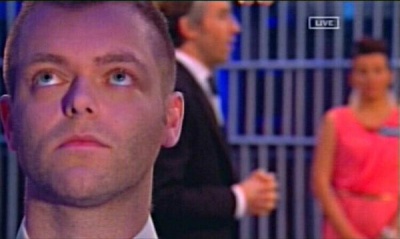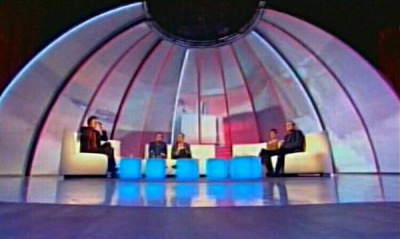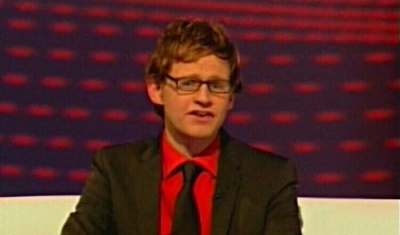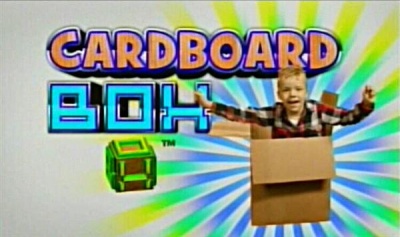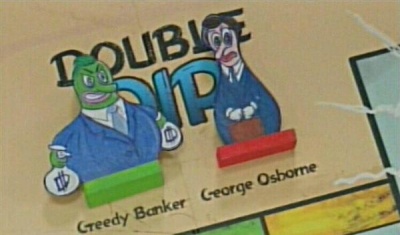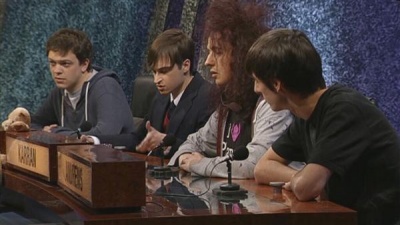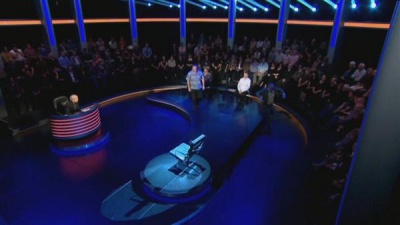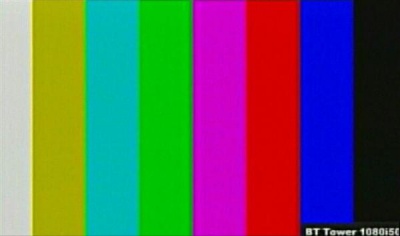Weaver's Week 2012-03-18
Last week | Weaver's Week Index | Next week
"If you want to share it, you give the cash, but if you want to take it all, you give the cash." The wisdom of George Lamb, unable to explain a share-or-shaft game there.
Contents |
The Mad Bad Ad Show
Objective Productions for Channel 4, 17 February – 2 March
This review based on the show transmitted on 2 March. Though we didn't know it until after publishing the review, the edition was cut by about a third to fit the half-hour slot.
Five comedians and two advertising executives have come together under what looks like half the Millennium Dome. It's a promising start, we all remember how successful that was as a tourist attraction. The lead comedian is Mark Dolan, dressed in a sharp red shirt, and after introducing the panel – six men, one woman, is that all they could get – he gets straight into round one, Classic Ads.
Here, the teams are shown a classic advertisement from the past, and have a discussion about what they've seen. "What, that's a real gorilla?" exclaims one of the panel to the first clip. There's a word from the advertising professional, explaining what made the clip so successful, and a couple of questions relating to the clip. One commercial for each team, two questions each, and it's likely to end 2:2. There's been an awful lot of mildly diverting conversation, and not many actually funny laughs, but doubtless it'll improve.
Actually, there's not a huge amount of time left – this opening round has already lasted for ten minutes, and the internal ad break is looming. Taking us there are some old commercials, this week themed around toy commercials. Host Mark Dolan is trying to channel Charlie Brooker with lines like "All they had to do was show how much fun it was to roll a circle of plastic around your hips." But then the script sniggers at a plastic animal called "Gaylord" and a toy cow that delivers milk.
And then there's a seemingly interminable discussion about the themes and ideas we've just seen. How long does this last? Ten thousand years? No, a mere five minutes, during which team captains Mark Watson and Micky Flanagan explain that they'll be trying to sell us a board game about the global financial crisis, and a cardboard box.
The real commercial break comes as merciful release. Afterwards, there's the Slogans round. In this entirely novel round, completely unrelated to anything else we've ever seen on the telly before, the teams are given part of an advertising slogan, and asked to complete it in a witty, original, amusing, or correct manner. Perhaps the only innovation is that the teams – and later the audience – use video-game remote controls to buzz in or cast votes.
With the game locked at 3:2, we move into the New Commercials round, worth a "whopping five points", according to the host. So, we've just sat through eighteen minutes of burbling and unfunny jokes – we might have raised about one chuckle at a particularly smart slogan – and everything we've seen is completely worthless. Great. Wonderful stuff. There's nothing like a show that gently builds to a natural conclusion, and this is nothing like a show that gently builds to a natural conclusion.
The fake commercials themselves are the best part of the show. One of the team captains has been making an advertisement about a cardboard box. Children can put themselves as racing car drivers, sailing a boat, or captains of a pirate ship. Imagination is the only limit. The other has been making fun of the thoroughly depressing banker's crisis, preparing cards like "You are Greece: pay no taxes and get the Germans to bail you out." The audience votes, and their winner is the show's winner.
"And that's pretty much it" says Mark Dolan. Not just for tonight's show, but for the series as a whole: it was taken off air after three weeks, having attracted even fewer viewers than The Bank Job.
What went wrong? The basic idea wasn't too bad: get people in to talk about commercials, make some spoof adverts of your own, and keep the jokes coming thick and fast. The execution was lacking: we didn't find the conversation to be sparkling or even particularly amusing, and the jokes were thin and tended to the obvious. There wasn't tremendous value in the missing words round, the stock photos of billboards with blatantly superimposed captions was so unreal as to distract from the jokes. Making an advert for a cardboard box is entertaining, but it's gone in 60 seconds. It's not enough to build a whole programme around.
It's not clear whether Mark Dolan was unable to keep control of the discussion, or if his ability was lost in the edit suite. Certainly Dolan wasn't the star of the show, allowing the panel to make their points, but he came across as hurrying up the show. The programme required a bigger character in the host's seat: dare we say that this could have been a vehicle for George Lamb? Nor was the format quite right: the programme couldn't decide whether it wanted to be Have I Got Commercials For You or whether it wanted to seriously explain why adverts work in the style of Washes Whiter.
There's nothing wrong with taking risks, and we reckon that only a few small changes stand between The Mad Bad Ad Show and a few years of success. A change of cast, a bit more wit, and it could have been a winner.
University Challenge
Actual Semi-Final 2: Pembroke Cambridge v UCL
Pembroke's last win came on 6 February, against Clare Cambridge. UCL got here by beating Balliol Oxford on 27 February. Pembroke are the only side to make the semis without losing once; UCL are the only side to shout "Uranus" and stick two thumbs up at the host. It's UCL who get the first starter, but questions about gods tend to evade them. The next starter is about glee clubs, and then a set of bonuses about information recall. The right answer is on the tip of the tongue. Sorry, it's "the tip of the tongue", as was mentioned during the conference. Gaah!
Cities named after Stalin get Pembroke rolling, though their knowledge of Shakespeare isn't tremendous. UCL know a theremin when Thumper describes one to them; Pembroke Cambridge know a fool's mate when they see it. The visual round is further winning moves in chess, which proves to be a losing strategy, UCL leads by 50-30. The tales of women in Greek tragedies give UCL the first maximum of the night.
There's a bonus Little Billy Shakespeare question, it again falls to Pembroke. It's good to know that someone else has studied enough of Marx to understand reification when we hear it; that, and economic guesswork – er, er, models – gives Pembroke their first lead of the night. It doesn't last long – Gordon puts UCL back ahead, but they fail to score with years that were square numbers. The audio round is pairs of composers, the first died in the year that the second was born. It falls to Pembroke, who are back in the lead, 100-85.
Pembroke are slightly unlucky to lose a missignal on the answer "taramasalata and galata" when the answer is "taramasalata and Galatasaray". We have no idea about the electrical effect Thumper's talking about, but UCL do, because it was mentioned in Star Trek, and they're back in the lead. But only for as long as it takes to say "The working classes smell". The question's actually asking after EM Forster's "Only Connect", the only quotation to lend its name to two game shows. Yes, it's a two-word answer.
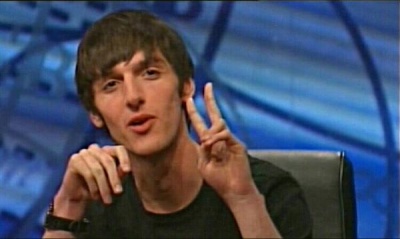 And they squeezed in a plug for The Voice, coming soon to BBC1.
And they squeezed in a plug for The Voice, coming soon to BBC1.
The second visual round is on the wedding at Cana, after which UCL has regained the lead, 110-105, and everyone has answered at least one starter correctly. Pembroke are back in the lead as they know the answer to the Fifteen-to-One memorial question: who are the recent home secretaries? Bonuses on mountains evade them, but they pick up Lammas day, and do well on parts of a city. Rarefied things give UCL a starter, but questions about refraction don't advance their score much. Looking at the clock, one starter to win it:
- Q: One of the most treacherous stretches of sea in the world, attributed to Lord Nelson, these words describe which Strait bridged by Thomas Telford in 1826 and Robert Stephenson in 1850?
The second dropped starter of the night, it's the Menai. We'll try again.
- Q: The harbour of Port-en-Bessin, in the Calvados department, and the island of La Grande Jatte on the outskirts of Paris...
- Pembroke, Pugh: Seurat.
There's our winner! Names beginning ZA allow Pembroke to cement their lead, and then they run up the score with binary stars and children's charities and the Odeon. At the gong, Pembroke has won by 185-125.
A slow game, only partly explained by the prolix music round: 45/77 the overall accuracy. Pembroke made 27/53 questions, UCL 18/45.
Next match: Manchester v this week's winners
Mastermind
Heat 22
Ged Meheran is first into the chair tonight, taking the Life and Times of Harold Wilson (1916-95). According to the official biography at Number10.gov.uk, Harold Wilson cannot be found. From other sources, we learn that Wilson was a leading light on the left wing of Labour, was elected party leader in 1963, and would be prime minister for most of the next thirteen years. It's said that the show can't be won in this round, but it can be lost – a very shaky start sees the contender score just one in the first 70 seconds, including an incorrection from "South Africa" to "Rhodesia", before pulling back to finish on 7 (0). Putting Huyton on the map: haroldwilson.net.
Geraldine (Gerri) Walters discusses Eleanor of Aquitaine (c.1122-1204). The successor to the Duchy of Aquitaine, Eleanor married the King of France, but it wasn't a happy marriage, and was annulled by the Pope. She then wed Henry, the future king of England. This was another unhappy relationship, and Eleanor supported many of her children in plots against Henry. She is buried in the abbey at Fontevraud, a fact that Judith Keppel knows well. No danger of a million right answers in two minutes, every chance of 14 (1). More: Alison Weir's history*.
Mike Clark has the sitcom Seinfeld (1990-98). The show revolved around four lead characters – Jerry Seinfeld, a struggling comedian; George Costanza, Jerry's best friend; Jerry's neighbour Kramer; and their friend Elaine. It revelled in absurdity, and delivered sharp observations on human nature. We have a suspicion that this round of questioning went in reverse chronological order, beginning with the final episode and probably ending to the pilot. The contender is a little too slow for that, 13 (0) the final score. Watch: Series 1 and 2*.
Which brings us to Michael O'Callaghan, taking Ludvig van Beethoven (1770-1827). Initially taught by his father, Beethoven was rehearsing a cathedral orchestra before his thirteenth birthday, and trained under Haydn in Vienna. He's best known for nine symphonies, a number of piano sonatas, and for going completely deaf in his thirties. The contender's known for the score 12 (2). Score more: the complete symphonies*.
Mr. Meheran (that's pronounced Mern, roughly) kicks off with the SAS, Cutty Sark, and the hypotenuse. Presidents of Afghanistan, eggs Benedict, some other songs by Leonard Cohen, and the England cricket team's inability to beat Ireland all advance the contender's score, which finishes on a very respectable 24 (0).
Michael O'Callaghan takes the chihuahua, Winston Churchill, and a bruleé dessert. We had completely forgotten that Jeremy Paxman hosted Start the Week, the contender forgets about rugby's Triple Crown. The contender finds the going stodgy, and finishes on 23 (8).
Michael Heseltine, the works of George Martin, and Angel Falls all provide points for Mike Clark, as does the Bishop of Petreburg. That's "Peterborough", if you're buying return train tickets there. Are there types of carrots? Suppose there must be. The contender's more than a bit lucky to get a question on the buzzer, taking his score to 24 (0).
Have we time for a play-off? Not if Gerri Walters can score eleven, and she has Atlanta and the Beehive, and the local question about Simmond's Yat to help her out. But then the scores slow down, she doesn't even remember Neil Hamilton, the minister for brown envelopes. Which means that, at life, the contender wins, but in this contest she finishes on 19 (10).
End of the round, but not the end of the contest. We have a tie. It means Eliot Wilson progresses to the semi-final as a high-scoring runner up. Swift answers: the Seychelles and Virgil are the only two correct answers given by Mr. Mahern. Mr. Clark hits with Wimbledon, blood, and Virgil. Which means that Mike Clark has had the rub of the green to become this week's winner, 3-2.
How did they fit in the tie-break without chopping a second off the rounds (and we've looked at the show again, and they didn't chop a second off the 18 minutes of quiz)? There weren't many passes, and they were dealt with more quickly than usual, the host didn't give the usual warning "two minutes starting now" before every round, or the appeal for contestants at the end. Nipping and tucking to find the two-and-a-half minutes for the tie-break, and still running a few seconds longer than usual.
It's back to the double-bills next week. Regular scheduling critic TV Cream Guide wrote, "There'd better be something [..] good coming up to excuse this ridiculously haphazard scheduling and the apparent need to churn it out as quickly as possible." What seems to have happened is that the BBC2 Scheduling Unit has decided that, rather than have Mastermind drag on most of the way until Wimbledon, they want to finish it before the snooker starts. We reckon the grand final is booked for an hour on 20 April, and the only way to fit eight shows in before then is to air them twice a week. Why the BBC2 Scheduling Unit has to put two out in a row confuses us – can't they use a vacant slot like 8pm Monday?
This Week And Next
Unsurprising news from ITV Towers: Red or Black is back. The show will now go out weekly, and the budget is reported to have been lowered. That's most obvious in the prize, which is £500,000 per show, with a rollover when it's not won. Channel controller Peter Fincham promised that the stunts would still be huge, that the contestants would have more control over their destiny, and that the budget cuts wouldn't be obvious on screen. Pink or Grey returns in the autumn.
Not content with a completely botched end game, The Bank Job had the most appropriate ending, as George Lamb's closing monologue was replaced by a tone and technical fault caption. It's entirely fitting: the first broadcast almost didn't make it to air owing to a technical fault, and every show in between has had something go wrong.
According to A Demi Observer, Radio 4 is taking The News Quiz stateside, hosted by someone called Lewis Black. Panellists for the pilot edition will be Andy Borowitz, Kathleen Madigan, Ted Alexandro, and another unconfirmed guest. Who are these people? Whatever happened to Francis Wheen? Has anyone seen Dame Sandi Toksvig?
For domestic consumption, the BBC will air a business show on BBC3. Someone called Richard Reed will hand out some money, and challenge young entrepreneurial types to make a profit. Suggestions that this is just a remake of Trade Your Way to the USA have been denied, as (er) the final doesn't take place stateside, and Saira Khan isn't giving a course in basic economics.
Ratings for the week to 4 March have been published by BARB. Dancing on Ice continues as the UK's most-seen game show, with 7m viewers. Let's Dance for Sport Relief picked up 5.85m viewers, and Who Dares Wins finished on 5.35m. University Challenge led BBC2's game show charge with 2.9m, Celebrity Juice brought 2.4m to ITV2, and Deal or No Deal had 1.7m on Channel 4. At the twelfth time of asking, an episode of The Bank Job made Channel 4's top 30, Saturday night's edition was seen by 1.35m viewers.
Elsewhere on the digital tier, Got to Dance concluded with 1.2m viewers, and ITV2's Take Me Out The Gossip reached 735,000 people. ITV claims that more people watch The Chase than see Pointless, but this only holds if they include the 220,000 people who see it on ITV+1 and don't count people who see either programme on catch-up. A new entry in the quietly-contested Lowest Score of the Year category: The Great Cake Bake on Wedding TV was seen by 7000 people. Must get round to reviewing that one week.
Two student institutions reach the end of their series this week – University Challenge (BBC2, 8pm Mon) and what we think is the last ever Accumulate! (ruon.tv, Wed). Just a Minute visits India (Radio 4, 6.30 Mon), and new runs of the highly popular Four Rooms (C4, 8pm Wed) and The Apprentice (BBC1, 9pm Wed). Who Wants to be a Millionaire (ITV, 8.30 Sun), School of Silence (CBBC, 4pm) and Junior Masterchef Australia (Watch, 7pm weekdays) all return. Sport Relief gives an excuse for Only Connect (BBC4, 8.30 Mon) and a telethon (BBC1, 7pm Fri). And then next Saturday, we've The Voice of Holland UK (BBC1, 7pm) and Britain's Got Talent (ITV, 8pm).
Links marked with a * help support the UKGameshows servers.
To have Weaver's Week emailed to you on publication day, receive our exclusive TV roundup of the game shows in the week ahead, and chat to other ukgameshows.com readers, sign up to our Yahoo! Group.

